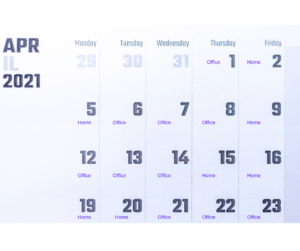
COVID-19 has changed so many things, but one thing many see continuing is its impact on workplace flexibility. Long considered an important perk for employees and job seekers alike, the meaning of flexible work schedules continues to be redefined in a COVID world.
Attract and Retain
Flexible schedules have long been a way to attract and retain talent. Recognizing this, many companies offered flexibility as a way to stay competitive and enhance one’s reputation as a place where people want to work and stay. Increasingly, the offering of flexible schedules has become an important indicator of whether a candidate will accept a role with a new employer as well as it being a way to retain talent.
Boost Productivity
Studies of the rapidly changing work world find remote employees spend less time being unproductive and work almost 17 more days each year, according to an Airtasker survey conducted prior to the pandemic. This is in part due to having more leeway to add in personal elements of planning and time for exercise and fresh air. The International Workplace Group reported 85% of businesses claim flexible schedules increase their business and 63% say flexible schedules create at least 21% productivity improvements.
Lower Expenses
With more employees working from home, there becomes less need for overhead expenses such as office space, water and electricity. For workers, the flexibility can also cut down on, or eliminate, the commute, offering savings when it comes to wear and tear on vehicles and fuel costs. For those who live in rural and less populated areas, flexible work schedules can open up options for work not previously available.
Finding Balance
But remote work also creates a new set of questions regarding where to draw the line between work and home life. Longer hours in front of the screen and conference calls and communication happening at all hours of the day and night make it difficult to know when it’s okay to not be working.
What Do You Think?
- Is remote work here to stay?
- What does a flexible work schedule look like?
- Will a hybrid of office and work from home become the new norm?
- How can the future of work accommodate both workers and employers?

